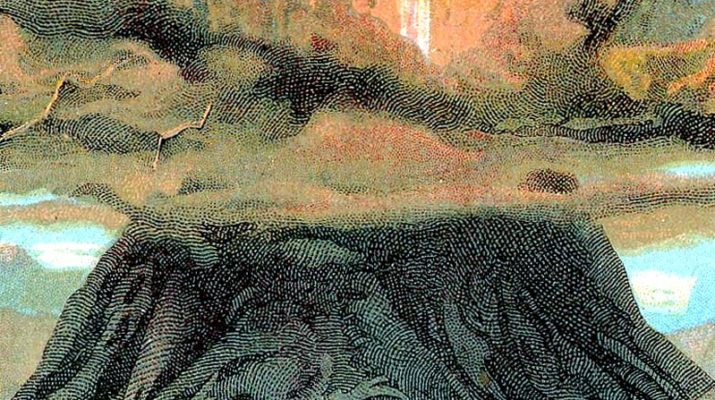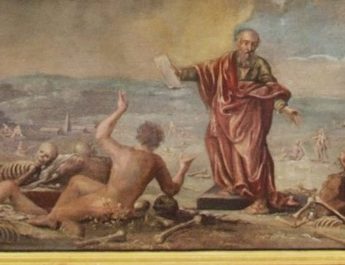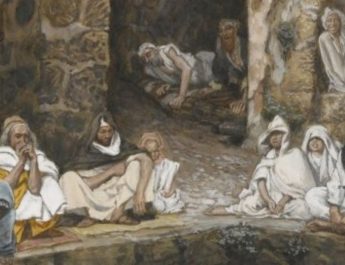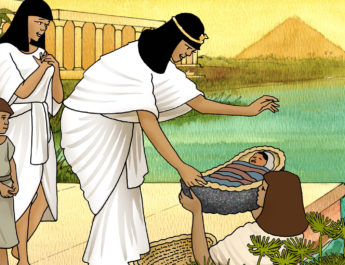Exodus 19:3-7 & 20:1-17
Narrative Lectionary 105
BibleHub
19:3 Then MosesI went upII to God;III the LordIV calledV to him from the mountain,VI
Notes on verse 19:3a
I “Moses” = Mosheh. From mashah (to pull out in a literal or figurative sense, to draw out) OR from Egyptian mes or mesu (child, son i.e. child of…). This is Moses – the one drawn out from the water, which is to say, rescued. If derived from the Egyptian, his name would share a root with Rameses and Thutmose.
II “went up” = alah. This is to go up, approach, ascend, be high, be a priority; to arise in a literal or figurative sense.
III “God” = Elohim.
IV “Lord” = YHVH. From havah (to be, become) or hayah (to come to pass, become, be). This is the name of the God of Israel, the self-existent and eternal one, the tetragrammaton. This pronunciation has been lost to time so “Lord” is generally used in its place.
V “called” = qara. This is to call or call out – to call someone by name. Also used more broadly for calling forth.
VI “mountain” = har. From harar (hill or mountain). This is mountain, hill, hilly region.
“Thus you shall say to the houseVII of JacobVIII and tellIX the Israelites:X
Notes on verse 19:3b
VII “house” = bayit. Probably from banah (to build, make, set up, obtain children; to build literally or figuratively). This is house, court, family, palace, temple.
VIII “Jacob” = Yaaqob. From the same as aqeb (heel, hind part, hoof, rear guard of an army, one who lies in wait, usurper). This is Isaac’s son and his descendants. The name means heel-catcher or supplanter.
IX “tell” = nagad. This is to declare, make conspicuous, stand in front, manifest, predict, explain.
X “Israelites” = ben + Yisrael. Literally, “children of Israel.” Ben is related to “house” in v19:3. From banah (see note VII above). This is son, age, child. It is son in a literal or figurative sense. Yisrael is related to “God” in v19:3. From sarah (to persist, exert oneself, contend, persevere, wrestle, prevail) + el (see note III above). This is Israel, meaning God strives or one who strives with God; new name for Jacob and for his offspring. This refers to the people and to the land.
4 ‘You have seenXI what I didXII to the EgyptiansXIII and how I boreXIV you on eagles’XV wingsXVI and broughtXVII you to myself.
Notes on verse 19:4
XI “seen” = raah. This is to see in a literal or figurative sense so stare, advise, think, view.
XII “did” = asah. This is to make, do, act, appoint, become in many senses.
XIII “Egyptians” = Mitsri. From the same as mitsrayim (Egypt); perhaps from matsor (besieged or fortified place, bulwark, entrenchment; something hemmed in; a siege or distress or fastness); from tsur (to confine, besiege, to cramp). This is Egyptian.
XIV “bore” = nasa. This is to lift in a broad sense, literally and figuratively. So it could be to carry, take, or arise. It could also be bring forth, advance, accept.
XV “eagles’” = nesher. This is an eagle or vulture – some kind of large bird of prey. Its root may mean lacerate.
XVI “wings” = kanaph. This is wing, edge, corner, extremity. It can also be a flap or fold of a garment or the pinnacle of a building.
XVII “brought” = bo. This is to enter, come in, advance, fulfill, bring offerings, enter to worship, attack. It can also have a sexual connotation.
5 Now, therefore, if you obeyXVIII my voiceXIX and keepXX my covenant,XXI
Notes on verse 19:5a
XVIII “obey” = shama + shama. This is to hear, call, consent, or consider. It implies listening intelligently, giving attention, and, because of these two factors, obedience and action are often implied. The word is repeated twice – the first time as an Infinitive Absolute. The Infinitive Absolute serves to emphasize the sentiment of the word. It is rather like Foghorn Leghorn’s speech pattern, “I said, I said.”
XIX “voice” = qol. This is a sound, used often for human voices. Also used when God speaks or angels, animals or instruments. It can be a cry or a noise, thunder or earthquakes and so on.
XX “keep” = shamar. This is to keep, watch, or preserve. It means to guard something or to protect it as a thorny hedge protects something.
XXI “covenant” = berit. Perhaps from barah (to eat, choose, make clear); perhaps from bar (grain, wheat); from bara (to select, purify, cleanse, test, brighten, polish). This is a compact, covenant, alliance, treaty, or league.
you shall beXXII my treasured possessionXXIII out of allXXIV the peoples.XXV Indeed, the wholeXXVI earthXXVII is mine,
Notes on verse 19:5b
XXII “be” = hayah. Related to “Lord” in v19:3. See note IV above.
XXIII “treasured possession” = segullah. 8x in OT. Root may mean to shut up – as treasure or wealth that is kept. Could be property, jewel, or any possession.
XXIV “all” = kol. From kalal (to complete). This is all or every.
XXV “peoples” = am. From amam (to darken, hide, associate; creating shadows by huddling together). This is people or nation. It can be used specifically for a tribe, collectively of troops or armies, or figuratively to refer to a flock of animals.
XXVI “whole” = kol. Same as “all” in v19:5. See note XXIV above.
XXVII “earth” = erets. Root may mean to be firm. This is earth, ground, field land, or country.
6 but you shall be for me a priestlyXXVIII kingdomXXIX and a holyXXX
Notes on verse 19:6a
XXVIII “priestly” = kohen. This is literally the one who officiates i.e. the priest. This is where the Jewish last name “Cohen” (and its variants) comes from.
XXIX “kingdom” = mamlakah. From the same as melek (king, royal). This is kingdom, dominion, sovereignty, rule. It can also refer to the realm.
XXX “holy” = qadosh. From qodesh (set apart and so sacred; God is different from us and so God is holy/set apart; things we dedicate to God’s service are set apart for God and so they, too, are holy); related to qadash (set apart, consecrated, hallowed, sanctified; something or someone set apart for a holy purpose or use – ceremonially or morally clean). This is sacred or holy in a ritual or moral sense. As a noun, it refers to a holy one (like a saint or angel), a holy place (the sanctuary), or God (the Holy One).
nation.’XXXI These are the wordsXXXII that you shall speakXXXIII to the Israelites.”
Notes on verse 19:6b
XXXI “nation” = goy. From the same root as gevah (the back, person, or body); related to gev (among); related to gaah (to rise up). This is nation or people. Often used to refer to Gentiles or foreign nations. It can also be used figuratively for a group of animals. This is where the Yiddish “goy” comes from.
XXXII “words” = dabar. From dabar (to speak, declare, discuss). This is speech, a word, a matter, an affair, charge, command, message, promise, purpose, report, request. It is a word, which implies things that are spoken of in a wide sense.
XXXIII “speak” = dabar. Related to “words” in v19:6. See note XXXII above.
7 So Moses went,XXXIV summonedXXXV the eldersXXXVI of the people, and setXXXVII beforeXXXVIII them all these words that the Lord had commandedXXXIX him.
Notes on verse 19:7
XXXIV “went” = bo. Same as “brought” in v19:4. See note XVII above.
XXXV “summoned” = qara. Same as “called” in v19:3. See note V above.
XXXVI “elders” = zaqen. From the same as zaqan (beard or chin – the beard represents old age). This is old, aged, or elder.
XXXVII “set” = sim. This is to put or place in a literal or figurative sense. It can be appoint, care, change, make, and may other things.
XXXVIII “before” = paneh. From panah (to turn, face, appear). This is face in a literal or figurative sense. It could be face, presence, anger, respect. It can also be used of God to indicate divine favor or presence.
XXXIX “commanded” = tsavah. This is to charge, command, order, appoint, or enjoin. This is the root that the Hebrew word for “commandment” comes from (mitsvah).
20:1 Then God spoke all these words,
2 “I am the Lord your God, who broughtXL you out of the landXLI of Egypt,XLII out of the house of slavery;XLIII 3 you shall haveXLIV no otherXLV godsXLVI beforeXLVII me.
Notes on verses 20:1-3
XL “brought” = yatsa. This is to go or come out, bring forth, appear. It is to go out in a literal or figurative sense.
XLI “land” = erets. Same as “earth” in v19:5. See note XXVII above.
XLII “Egypt” = Mitsrayim. Related to “Egyptians” in v19:4. See note XIII above.
XLIII “slavery” = ebed. From abad (to work, serve, compel; any kind of work; used causatively, can mean to enslave or keep in bondage). This is a servant, slave, or bondservant.
XLIV “have” = hayah. Same as “be” in v19:5. See note XXII above.
XLV “other” = acher. From achar (to be behind, delay, be late, procrastinate, continue). This is following, next, strange, other.
XLVI “gods” = Elohim. Same as “God” in v19:3. See note III above.
XLVII “before” = paneh. Same as “before” in v19:7. See note XXXVIII above.
4 “You shall not makeXLVIII for yourself an idol,XLIX whether in the formL of anythingLI
Notes on verse 20:4a
XLVIII “make” = asah. Same as “did” in v19:4. See note XII above.
XLIX “idol” = pesel. From pasal (to hew, carve; used for wood or stone). This is an idol or image.
L “form” = temunah. 10x in OT. From the same as min (kind, sort, species). This is something that has been apportioned or fashioned. It can be an embodiment or shape. It can also figuratively be a favor that manifests.
LI “anything” = kol. Same as “all” in v19:5. See note XXIV above.
that is in heavenLII aboveLIII or that is on the earth beneathLIV or that is in the waterLV underLVI the earth.
Notes on verse 20:4b
LII “heaven” = shamayim. Root may mean being lofty. This is sky, the air, or heaven. It is in a dual noun form so this might refer to the part of the sky where the clouds move on the one hand and the part beyond that where the sun, moon, and stars are on the other hand.
LIII “above” = maal. Related to “went up” in v19:3. From alah (see note II above). This is the upper part, forward, high above, upwards, greater, heaven, or exceedingly.
LIV “beneath” = tachat. This is underneath, below, the bottom, instead of.
LV “water” = mayim. This is water, waters, or waterway in a general sense. Figuratively, it can also mean juice, urine, or semen.
LVI “under” = tachat. Same as “beneath” in v20:4. Se note LIV above.
5 You shall not bow downLVII to them or serveLVIII them, for I the Lord your God am a jealousLIX God,LX
Notes on verse 20:5a
LVII “bow down” = shachah. This is to bow down, make a humble entreaty, to do homage to royalty or to God.
LVIII “serve” = abad. Related to “slavery” in v20:2. See note XLIII above.
LIX “jealous” = qanna. 6x in OT– all in the Torah, all referring to God as a jealous God. From the same as qinah (zeal, jealousy, envy, anger, rivalry) OR from qana (to be jealous, zealous, envious). This is jealous.
LX “God” = El. Related to “God” and “Israelites” in v19:3. See note III above.
punishingLXI childrenLXII for the iniquityLXIII of parentsLXIV to the thirdLXV and the fourthLXVI generation of those who rejectLXVII me
Notes on verse 20:5b
LXI “punishing” = paqad. This is to attend to or visit – can be used for a friendly or violent encounter. So, it can be to oversee, care for, avenge, or charge.
LXII “children” = ben. Same as “Israelites” in v19:3. See note X above.
LXIII “iniquity” = avon. Perhaps related to avah (to bend, twist, be amiss). This is sin, mischief, guilt, fault, punishment for iniquity, or moral evil.
LXIV “parents” = ab. This is father, chief, or ancestor. It is father in a literal or figurative sense.
LXV “third” = shillesh. 5x in OT. From the same as shalosh (three, fork, triad). This is third or relating to the third. Here, it refers to a great-grandchild.
LXVI “fourth” = ribbea. 4x in OT. From the same as arba (four); from raba (to make square or be four-sided). This is fourth or related to the fourth. Here, it would be a great, great grandchild.
LXVII “reject” = sane. This is to hate, an enemy. It is a personal hatred and not an abstract one.
6 but showingLXVIII steadfast loveLXIX to the thousandthLXX generation of those who loveLXXI me and keep my commandments.LXXII
Notes on verse 20:6
LXVIII “showing” = asah. Same as “did” in v19:4. See note XII above.
LXIX “steadfast love” = chesed. From chasad (being good, kind, merciful; may mean bowing one’s neck as is done in the presence of an equal for courtesy’s sake; so, if one in a superior position is treating you like an equal, that is what is captured here). This is favor, goodness, kindness, loving kindness, pity, reproach, or a good deed. When done by God to humanity, this is mercy/loving kindness. When done by humanity to God, it is piety.
LXX “thousandth” = eleph. Perhaps from the same as eleph (herd, cattle); from alaph (to learn, speak, associate with). This is thousand.
LXXI “love” = aheb. This is to love, beloved, friend. It is to have affection for sexually or otherwise.
LXXII “commandments” = mitsvah. Related to “commanded” in v19:7. From tsavah (see note XXXIX above). This is a commandment, law, ordinance obligation, or tradition. It is something commanded whether by God or by a human authority. This term is sometimes used collectively to refer to the Law.
7 “You shall not makeLXXIII wrongfulLXXIV use of the nameLXXV of the Lord your God,LXXVI for the Lord will not acquitLXXVII anyone who misusesLXXVIII his name.
Notes on verse 20:7
LXXIII “make” = nasa. Same as “bore” in v19:4. See note XIV above.
LXXIV “wrongful” = shav. Perhaps from the same as sho (ruin, desolation, storm; from a root that means rushing over – hence a storm and hence devastation). This is emptiness, false, worthless, deceit. It can also refer to evil, guile, idolatry, or something being in vain.
LXXV “name” = shem. Related to “set” in v19:7. May be from sim (see note XXXVII above). This is name, fame, renown. A name was thought to indicate something essential about a person – something about their individuality. So, this word can also mean honor, authority, or character.
LXXVI “God” = Elohim. Same as “God” in v19:3. See note III above.
LXXVII “acquit” = naqah. This is to be empty, cleanse, acquit, blameless, immune, innocent. It is to be clean or to make clean in a literal or figurative sense. It can also be bare in a negative sense, destroyed.
LXXVIII “misuses” = nasa…shav. Nasa is the same as “bore” in v19:4. See note XIV above. Shav is the same as “wrongful” in v20:7. See note LXXIV above.
8 “RememberLXXIX the SabbathLXXX dayLXXXI and keep it holy.LXXXII
Notes on verse 20:8
LXXIX “remember” = zakar. This is to remember, to mark something so that it can be recalled, to be mindful of, to mention.
LXXX “Sabbath” = Shabbat. From shabath (to rest, stop, repose, cease working; by implication, to celebrate). This is sabbath, literally meaning rest or intermission.
LXXXI “day” = yom. Root may mean being hot. This is the day in a literal or figurative sense. It can also mean birth, age, daylight, continually or other references to time.
LXXXII “keep…holy” = qadash. Related to “holy” in v19:6. From qodesh (see note XXX above). This is set apart, consecrated, hallowed, sanctified. This is something or someone that is set apart for a holy purpose or use – ceremonially or morally clean.
9 SixLXXXIII days you shall laborLXXXIV and do all your work.LXXXV 10 But the seventhLXXXVI day is a Sabbath to the Lord your God;LXXXVII you shall not do anyLXXXVIII work—
Notes on verses 20:9-10a
LXXXIII “six” = shesh. This is six. Figuratively, it can be a surplus since it is one more than the number of fingers on the hand.
LXXXIV “labor” = abad. Same as “serve” in v20:5. See note LVIII above.
LXXXV “work” = melakah. From the same as malak (messenger, an angel, or a deputy; human messengers literally or for prophets, priests, or teachers as messengers of God; also supernatural messengers i.e. angels). Properly, this is a deputyship or some kind of work. It can also be the product that comes from labor.
LXXXVI “seventh” = shebii. From sheba (seven – the number of perfection/sacred fullness). This is seventh.
LXXXVII “God” = Elohim. Same as “God” in v19:3. See note III above.
LXXXVIII “any” = kol. Same as “all” in v19:5. See note XXIV above.
you, your sonLXXXIX or your daughter,XC your maleXCI or female slave,XCII your livestock,XCIII or the alien residentXCIV in your towns.XCV
Notes on verse 20:10b
LXXXIX “son” = ben. Same as “Israelites” in v19:3. See note X above.
XC “daughter” = bat. Related to “house” and “Israelites” in v19:3. From ben (see note X above). This is daughter in a literal or figurative sense.
XCI “male” = ebed. Same as “slavery” in v20:2. See note XLIII above.
XCII “female slave” = amah. This is female servant or slave, handmaid.
XCIII “livestock” = behemah. This is animal or cattle. It is often used of large quadrupeds.
XCIV “alien resident” = ger. From gur (to abide or sojourn; to leave the road to lodge or for any other reason). This is sojourner, guest, stranger, foreigner.
XCV “towns” = shaar. May be related to sha’ar (to calculate or reckon; may come from a root that means to open up or split). This is a gate, door, or other opening like a port.
11 For in six days the Lord made heaven and earth, the sea,XCVI and all that is in them, but restedXCVII the seventh day; thereforeXCVIII the Lord blessedXCIX the Sabbath day and consecratedC it.
Notes on verse 20:11
XCVI “sea” = yam. Root may mean to roar. This is the sea, often referring to the Mediterranean. It comes from the root in the sense of the roar of crashing surf. This word is sometimes used for rivers or other sources of water. It can mean to the west or to the south.
XCVII “rested” = nuach. This is to rest, calm, camp, free, place, remain, satisfy, settle, station, or wait. It is rest and so implies settling down in a literal or figurative sense. This is perhaps the root verb of the name “Noah.”
XCVIII “therefore” = ken. Perhaps from kun (properly, in a perpendicular position; literally, to establish, fix, fasten, prepare; figuratively, it is certainty, to be firm, faithfulness, render sure or prosperous). This is to set upright. Generally used figuratively to mean thus, so, afterwards, rightly so.
XCIX “blessed” = barak. This is to kneel, to bless. It is blessing God as part of worship and adoration or blessing humans to help them. It can be used as a euphemism to say curse God.
C “consecrated” = qadash. Same as “keep…holy” in v20:8. See note LXXXII above.
12 “HonorCI your fatherCII and your mother,CIII so that your days may be longCIV in the landCV that the Lord your GodCVI is givingCVII you.
Notes on verse 20:12
CI “honor” = kabad. To be heavy, weighty, or severe. It can also be positive abounding in, rich, or honorable. The Hebrew word for “glory,” kabod, is taken from this root.
CII “father” = ab. Same as “parents” in v20:5. See note LXIV above.
CIII “mother” = em. This is a mother as binding a family together or a breeding female animal. It could be mother in a literal or figurative sense.
CIV “be long” = arak. This is to continue, lengthen prolong, delay, or endure. It is being long or causing something to be long in a literal or figurative sense.
CV “land” = adamah. From the same as adam (man, humankind); perhaps from ‘adom (to be red). This is ground, earth, soil as red, or land.
CVI “God” = Elohim. Same as “God” in v19:3. See note III above.
CVII “giving” = natan. This is to give, put, set, offer. It is to give literally or figuratively.
13 “You shall not murder.CVIII
14 “You shall not commit adultery.CIX
15 “You shall not steal.CX
Notes on verses 20:13-15
CVIII “murder” = ratsach. Properly, this is to dash something to pieces. It is to kill a person, but it is used particularly (though not exclusively) for murder.
CIX “commit adultery” = naaph. This is to commit adultery or, figuratively, to be an apostate.
CX “steal” = ganab. This is to steal in a stealthy way rather than through violence. It can also mean to deceive. There is a Yiddish word ganef that derives from this root. It means thief or scoundrel.
16 “You shall not bearCXI falseCXII witnessCXIII against your neighbor.CXIV
Notes on verse 20:16
CXI “bear” = anah. This is answer, respond, announce, sing, shout, or testify. It means to pay attention, which implies responding and, by extension, starting to talk. Used in a specific sense for singing, shouting, testifying, etc.
CXII “false” = sheqer. This is deception, lie, or disappointment. It can also be something that is vain or wrongfully.
CXIII “witness” = ed. From ud (to admonish, repeat, duplicate, testify, restore, record, relieve). This is a witness, testimony, or one who records testimony. It can also refer to a prince.
CXIV “neighbor” = rea. From raah (to associate with). This is the same as neighbor in Leviticus 19:18 “love your neighbor as yourself.” This is friend, companion, fellow, neighbor. It is someone with whom you associate, whether more or less close.
17 “You shall not covetCXV your neighbor’s house; you shall not covet your neighbor’s wife,CXVI male or female slave, ox,CXVII donkey,CXVIII or anything that belongs to your neighbor.”
Notes on verse 20:17
CXV “covet” = chamad. This is to desire or delight in someone or something. It can also mean something that is precious or coveted. So, it can also refer to lust.
CXVI “wife” = ishshah. From ish (man); perhaps from enosh (human, humankind, mortal); from anash (to be weak, sick, or frail). This is woman, wife, or female.
CXVII “ox” = shor. Perhaps from shur (to travel, turn, journey; travelling like a prostitute or a merchant). This is bull, ox, head of cattle, cow.
CXVIII “donkey” = chamor. From chamar (to be red, blush). This is a male donkey.
Image credit: “Ten Commandments” by published by the Providence Lithograph Company, 1907.




